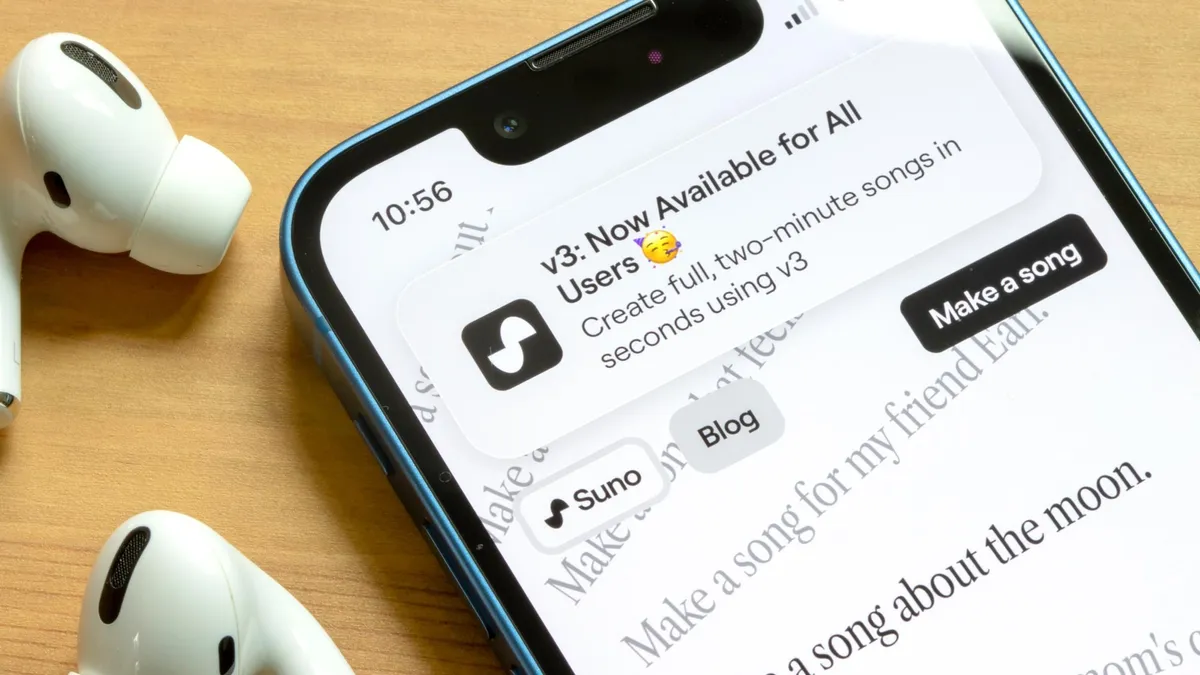I write about AI for a living and Suno v4 is so good it put a smile on my face
Lyrical mastery from AI

Just eight months since Suno, the AI music generator launched to the public with a bang, the company is back with v4 of its powerful song generator.
Suno v4 is designed to be a step up from the original version, with vastly improved sound and some cool new functionality thrown in. I put on my music mogul hat this week to give it a run-through, and see whether the enthusiastic marketing blurb matches the reality.
There are a number of things that have apparently come together in this new release to improve the product. To be honest it needed the upgrade since Suno had a bit of a reputation of providing subpar audio quality, and pretty weak lyrics.
The good news is Suno v4.0 is a solid improvement over the previous version. The sound quality of the instruments and vocals is now at least as good as that of Udio, the main rival for the AI music crown, and the new ReMi (pronounced ‘ray me’) lyric writer is a little treasure in many ways.
Improvements in lyric generation
The company bills ReMi as an edgier lyric creator, and in my testing I found it was definitely a refreshing change from some of the banal AI-generated slop that both Udio and Suno have produced in the past. No neon, whispers or echoes in the mix at all. Cue a huge sigh of relief.
As well as the lack of lyrical drivel, the real uplift comes from the more natural language that’s used in the tracks. AI music platforms have to date suffered from bland, cheesy word structures, which at times become almost laughable.
This new lyric generator produces punchier, less obvious lyrical phrasing. And it makes a lot of difference to the final product. Be aware though, it can stray into offensive territory at times, so definitely keep watch on younger users.
In practice I found it stupidly easy to enter short five word prompts, let the lyric generator do its work, and sit back while the platform produced something which was remarkably decent.
Alas, Suno still has a tiny problem knowing how to end a song, and several of the test tracks I created stopped abruptly mid phrase for no reason, very annoying.
Some issues remain with edits
I also have to nitpick a little over the lingering clunkiness in song editing. Unlike Udio which provides a rich tapestry of editing functions, Suno still struggles with even basic things like extensions. If you extend a song you get a new generation, rather than something tacked onto the end of the original track.
This means you have to use an external editor like Audacity to compile the final song, which is a shame. The crop and replace section editing is also a bit more complicated than necessary, and definitely more so than the equivalent functions in Udio.
However on the positive side, the song cover function is really good. In my tests updating old tracks I had created in Version 3, the vocals and the instrumentation improved significantly with a new cover generation. I found it much better than the remastering function, which didn’t really seem to deliver a huge uplift in the sound quality as far as I could tell.
Personas are improved
By far the feature I had the most fun with was Personas. Selecting a stored genre and vibe, and then just triggering some interesting lyrics with a simple prompt, is about as effortless as you can get in terms of song-making.
Especially when you remember that Suno generally produces full or nearly full 3 minute songs from a single prompt most of the time.
And even though the sound is not 100% consistent track to track, it's still close enough to let you produce music that sounds like it comes from a single artist. If you close your eyes and squint a bit.
An addictive distraction
In the end, I got into a groove and started to one-shot prompt songs for hours, and in fact ended up with an album of ten tracks from one Persona, produced in a mere five hours.
I wanted to test what the overall quality would be like, so I did zero editing after generation. As you’d expect some of the tracks were a little dicey, to say the least, but considering the lack of effort I put into managing the process, the results were remarkable.
I may be a rubbish songsmith, but at least I’m a happy one. And that’s the point, isn’t it?
This technology is moving so fast, it’s mind-blowing. Verdict? It’s a great upgrade. The Personas are a total hit with this new audio and lyrical quality. I generated more interesting and likeable tracks in my testing than I’ve ever done before on either platform.
I can now see a future where a huge amount of genuinely good, if not great, music is going to be produced by these tools. Especially if Udio’s upcoming Version 2.0 matches or exceeds this quality.
Are we ready for a world awash with amateur productions? Who knows.
Now excuse me, I’ve got a red hot K-Pop, acid jazz combo which needs some prompting from my brain. Look, I may be a rubbish songsmith, but at least I’m a happy one. And that’s the point, isn’t it?
More from Tom's Guide
- Apple CarPlay is getting 3 big upgrades with iOS 18 — what you need to know
- Here's how Apple can close the AI gap with Google
- Apple's upcoming iOS 18 AI features may carry a ‘preview’ label — here's why
Sign up to get the BEST of Tom's Guide direct to your inbox.
Get instant access to breaking news, the hottest reviews, great deals and helpful tips.

Nigel Powell is an author, columnist, and consultant with over 30 years of experience in the technology industry. He produced the weekly Don't Panic technology column in the Sunday Times newspaper for 16 years and is the author of the Sunday Times book of Computer Answers, published by Harper Collins. He has been a technology pundit on Sky Television's Global Village program and a regular contributor to BBC Radio Five's Men's Hour.
He has an Honours degree in law (LLB) and a Master's Degree in Business Administration (MBA), and his work has made him an expert in all things software, AI, security, privacy, mobile, and other tech innovations. Nigel currently lives in West London and enjoys spending time meditating and listening to music.










